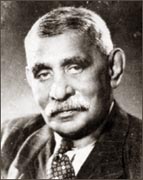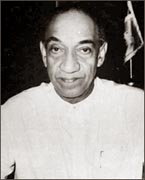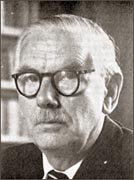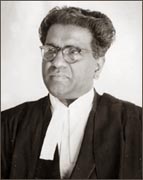Majoritarianism and the Mother of Parliaments
 Models:
One of the more bizarre aspects of our centrist and left-leaning parties
is their steadfast adherence to British models. Models:
One of the more bizarre aspects of our centrist and left-leaning parties
is their steadfast adherence to British models.
This was most prominently seen in the manner in which Dr. Colvin R de
Silva, way back in 1972, made a fetish of the doctrine of the supremacy
of Parliament, which he derived from his understanding of the manner in
which the British Constitution, that superb figment of a collective
imagination, worked so effectively for three hundred odd years.
 |
 |
 |
 |
| D S
Senanayake |
J R
Jayewardene |
Sir
Ivor Jennings |
Dr.
Colvin R de Silva |
Steeped as he was in the grand ideals of the past, leavened by a
practical dash of Marxism, Dr de Silva failed to register, or to
explore, how that particular doctrine depended on a very different
concept of parliamentarians from that which obtained in the late 20th
century.
Parliamentarians, in the great days of Parliament, were individuals,
representing - as Burke so brilliantly put it - first and foremost the
highest interests of their country. The idea that they were mere
representatives of their parties was anathema to him.
Expulsion
Of course in those days Parliamentarians could generally be assumed
capable of assessing independently the highest interests of their
countries. That is no longer the case, and therefore there is some sense
in the concept of the party whip, which developed even in England, and
was brought to a fine art here by J R Jayewardene when he instituted the
principle of expulsion from Parliament following expulsion from a party.
But, when one accepts the principle of party control, either as
reality or as a logical corollary of the manner in which
parliamentarians are now chosen, the idea that Parliament is supreme
becomes questionable.
In the old days I used to think Dr de Silva was being disingenuous in
asserting that Parliament was supreme, when he knew that a majority of
Parliament was under the control of the party hierarchy, which was
synonymous with the executive of the country.
But, at least until that executive rid itself of the LSSP, he was
perfectly happy for both the executive and the legislature to be firmly
under the control of the same person or persons.
This meant that, since the principle functions of Parliament are the
passing of laws and control of the executive through its financial
powers, the executive was in fact able, through its control of
Parliament, to pass whatever laws it wanted, and to govern without
financial constraints.
Later however, for as I grow old I appreciate more the psychological
dimensions of political predilections, I realised there was a very good
reason for our leftists refusing to look at anything but the British
model. Very simply, the alternative was associated with America, that
Great Satan for so many of our intellectuals of past and present.
The fact that much that is admirable in the American Constitution
derived from European philosophers was forgotten. Thus though
subsidiarity, the separation of powers, the supremacy of a Basic Law,
are referred to, they are not explored with the attention to
authoritative models, Swiss or French or German, practical or
theoretical, that would help us understand what features should be
incorporated into our body politic, and how they can best be adapted to
our particular requirements.
Despite various study tours eagerly undertaken by would be
constitution makers, there is little trace in what is canvassed now of
these or other principles that would help us escape from the mess into
which our three local constitutions have cast us.
Under threat
I use the word local about all three advisedly, even though current
wisdom is that the Soulbury Constitution was an import from Britain. On
the contrary, it was drafted by Sir Ivor Jennings at the behest of D S
Senanayake.
Determined as he and his Board of Ministers were to get rid of the
inconvenient Committee System of the Donoughmore Commission (which had
ignored the elitist preferences of Ceylonese politicians), he had
recourse to the British oppositional system, which meant by then, given
the power of political parties, majoritarianism with a vengeance.
In declaring that majoritarianism is the root of many of our
problems, I am not talking only of the abuses minorities have suffered.
I refer too to the abuse of opposition parties and interests that has
often been a hallmark of our political system.
Despite this, when parties are in power they forget completely that
they are liable to suffer worse, given our tendency to follow the
example of the Demoness Kali in the Saddharma Ratnavaliya story.
Indeed, the one institutionalised measure that has limited
majoritarianism in this country (so that the excesses of the Jayewardene
government have not been repeated), the change from a simple majority
electoral system to proportional representation, also now seems under
threat.
Practically everyone since 1994 has paid lip service to a mixed
system, thus vindicating the seminal suggestions of Chanaka Amaratunga,
who was excoriated at the time for introducing foreign ideas (German, I
should note, not the British / American system I that some now assume
was indigenous to Sri Lanka.
However, the actual alternative systems suggested, beginning with
Prof Peiris' proposals in 1995, are for a simple majority system topped
up by proportionately selected members to a limited extent that would
not seriously dent the domination of the majority.
Such domination would be available even to a party that won a vast
majority of seats with just a plurality, which the UNP could do given
the tendency of our centrist and left parties to squabble on small
issues, as they did in 1977, and spite each other with self-destructive
efficacy.
Principles
Meanwhile there is no attention to the principles on which an
electoral system should be constructed. One obviously should be that
citizens be adequately represented, which means small constituencies
rather than the large districts in which heaps of candidates now
compete, at vast expense, against those in their own parties as well as
in others.
But another should be that all segments of the population be fairly
represented, which means that the whole parliament should be
proportional to votes cast, not only the topping up segment.
This last principle is obfuscated by the racist tosh tossed out by
political science tuition notes which students regurgitate ad nauseam,
claiming it is the minorities that have from proportional
representation.
Neither students nor their doctrinaire mentors look at the facts,
which show that the TULF got more seats as a percentage of the whole
Parliament in 1977, on a simple majority system, than the TNA did in
2004 under proportional representation.
Forgotten is the fact that the principal opposition party has
benefited most under proportional system, which helped reduce the
authoritarianism and constitutional manipulation that was a feature from
1970 to 1988.
And this hankering after majoritarianism on the British model extends
even to another aspect of Parliament in which the Americans moved
smartly away from the Mother of Parliaments. I refer to the idea of a
Senate, where alas the shade of Sir Ivor Jennings once more rears its
hoary head.
Of course I may be doing Sir Ivor an injustice, and the Senate Ceylon
had with spectacular uselessness for a quarter of a century after
independence may have been devised by D S Senanayake rather than his
devoted constitutional expert. But since Sir Ivor then tried to
perpetrate something similar in Nepal, when asked by its King to advise
on a Constitution, the conclusion is that that ridiculous rubber stamp
was dear to his heart.
Domination
I say rubber stamp, because that Senate replicated the domination of
the executive over the lower House, with knobs on as it were. Half the
Senate was elected by Parliament, which meant a majority of that half
was selected by those who had a majority in Parliament. This was by a
complicated election system called the Single Transferable Vote.
In the early days there were elections which caused mathematical
headaches to the Clerk to the House, as the Secretary General of
Parliament was then called. After 1964 however a more enterprising and
perhaps more lazy Clerk told the Prime Minister and the Leader of the
Opposition that, given the numbers they controlled, they would get three
and two Senators respectively of the five elected every two years.
It would save everyone a lot of trouble if they restricted themselves
to nominating the exact number of electable candidates.
The politicians followed his advice which confirmed that the party
allegiances of elected Senators were a foregone conclusion. And, in
addition to these fifteen predictable worthies, there were fifteen more,
five nominated every two years by the Governor General. Since the
Governor General acted on the advice of the Prime Minister, this meant
that the Prime Minister had the support of the fifteen appointed
Senators in addition to the nine he had got elected.
In short, instead of the Senate being a forum of independent debate
and analysis, it provided a classic case of the second copy of the
morning paper bought to check that what the first said was true.
Sadly, this is basically the model the SLFP has suggested in its
proposals for Constitutional Reform. One third of the Senate is to be
proportionate to the vote for Parliament, while another third is to be
appointed by the President.
The other third will be District Chief Ministers, appointed by the
President in concurrence with the District Councils.
The problem here is not that the President would thus invariably
control a majority of the Senate. That could be a problem if he did not
control a majority in Parliament, but since this would lead to
complications anyway, the situation of the Senate then will be the least
of the country's problems.
Rather, the problem is that the President's control of the Senate
would be on the same basis as his control of the lower house, which is
what would make such a Senate a rubber stamp and hence redundant.
Model
It seems that, as way back in the forties, our politicians have
looked on the House of Lords as a model. The upper house contained
worthies appointed by the Sovereign, some chosen to represent the
opposition. Hereditary members generally managed not to upset the
balance, and now cannot do so given the recent reform.
What Jennings missed however was the signal contribution of British
individualism, and the traditions of the Lords which have even now,
despite the strengthening of party feeling in politics elsewhere,
ensured a more dispassionate approach to political questions than was
possible in Sri Lanka.
Now of course the problem has been compounded by the Head of State in
Sri Lanka being an active and powerful politician. Even if he genuinely
wanted to nominate only those who he felt would, regardless of political
opinions or party affiliations, contribute to assessing legislation, he
would find it difficult to resist partisan pressures.
The manner in which nomination to Parliament on the National List has
been hijacked by party rather than national interests - making a mockery
of the claim of the tuition brigade that it is a way of ensuring
enlightened members of Parliament - makes it clear that a Senate
nominated by the President will hardly fulfil the purpose of a Second
Chamber.
But, once again, we have failed to consider what the purpose of a
Second Chamber is. Certainly it is to review legislation - and perhaps
also assess appointments to senior administrative and executive
positions - but it needs to do this from a perspective that is different
to that of the lower House.
That is why, in all mature democracies - and none of them, I believe,
except for New Zealand, does not have one - the second chamber is the
repository of the interests of the people calculated in a different
manner from those represented in the principal chamber.
Sharing of Power
Generally, upper Houses represent regions, with weightage to ensure
restrictions of the power of the dominant group in any society, who
would tend to have a majority in the lower house since that is selected
purely on the basis of population.
Once again I do not mean only a dominant racial group. Rather, in the
United States or Australia or Germany or India, representation is on the
basis of provinces or states, with greater or lesser weightage to ensure
that the units with large populations and hence large numbers in the
lower house cannot dominate the parliamentary process.
The SLFP proposals go some way towards this in giving each District
one member, for the third of the Senate based on Districts. But without
any such limitation on the other two thirds, we are bound once again to
have the domination of the Western Province, with a little help from its
Kandy / Kurunegala / Galle / Matara District urban associates.
Besides, putting the District Chief Ministers in the Senate,
necessitating their constant attendance in Colombo if the Senate is to
fulfil its functions seriously, will take away from their primary
commitment to their Districts.
Rather, what would make more sense is members elected direct to the
Senate from Districts or Provinces. The latter would be preferable, for
any unit would need about five members if diversity were to be
adequately represented, while the Senate should be compact so as to
build up a strong collegiate identity.
Nine Provinces electing five members each by Single Transferable
Vote, the mathematical complexities now simplified with computers, would
produce a viable Senate, which would, as the SLFP proposals so
eloquently put it, 'facilitate sharing of power at the centre'. |

